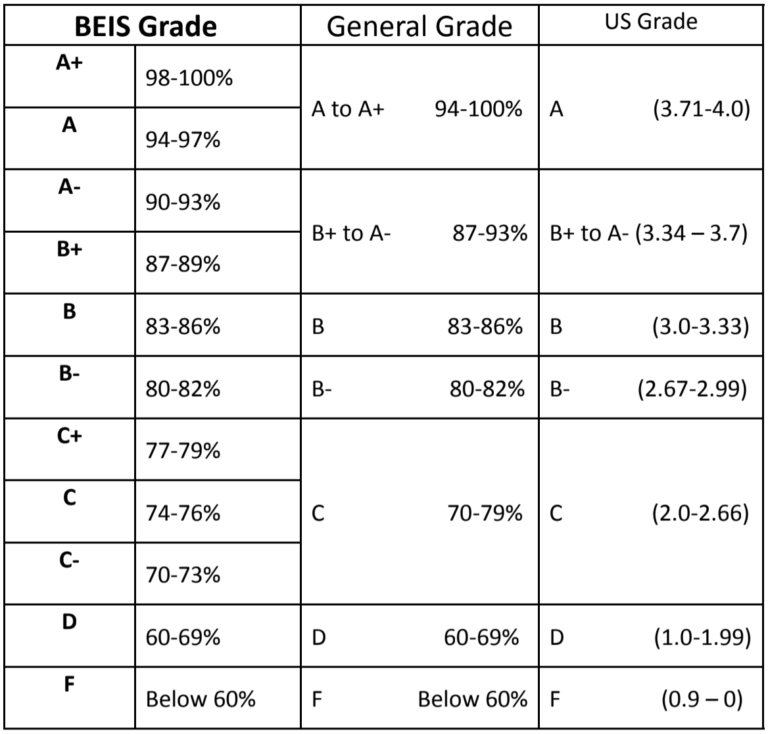Evaluation & Assessment Policy
Student Evaluation and Grading
The school follows the philosophy that a clear goal, an encouraging and positive learning atmosphere and transparent evaluation will respond positively to the opportunity for success. The school seeks to make achievements both recognisable and possible for students. Teachers will use a variety of assessment tools when evaluating students’ performance. They will be evaluated through the use of projects, quizzes, rubrics, practical examinations, and written examinations. The schedule of the trimester examinations are outlined in the school calendar.
Assessment
Nursery and Kindergarten will receive a descriptive progress report card while all other grades will receive letter grades and summary comments. Grades are based on regular assessments according to the school’s guidelines. This includes a final assessment at the end of each trimester.
- For LA and Math in all grades.
- For other subjects dependent on grades.
The final grade is a composite score including major exams and quizzes, classroom assessments, homework, and projects, research and class participation. Students who are absent without a valid excuse on the day of major exams, especially final examinations, may receive a failing grade for the examination missed. Students who are excused are allowed to take alternative forms of evaluation or take a make-up exam. In the event of school cancellation, exams will be postponed. The Head teacher may approve requests for early examinations at the end of the year after submitting a written request for sufficiently compelling reasons.
Behaviour During Assessment & Consequences
Students are expected to be well prepared for assessments and act responsibly and honestly. A student found cheating will have papers removed and may earn a failing grade.
Students who receive grades for a subject area below D are considered to have failed that subject. Students who fail major subject areas such as Math, English, Social Studies and Science will need to speak to the Head of School, along with their teachers & parents in order to discuss the necessary steps of action. Students may be required to stay back a year in extreme cases.

Academic Year
It is important for parents to be aware that as BEIS follows the European And North American school calendar and therefore has different class cut of ages to those of Philippine private schools. If students should leave before they complete a full year at BEIS and then enroll in a Philippine Private school this may affect the grade they are placed in. In some rare cases this may even result in a student having to repeat the year.
Elective Study
Elective study focuses on the 2 core subjects Language Arts and Mathematics. Students from Grades 4 and above receive 2 elective study classes per week. Instead of being split by grades students are placed into ability groups and use this time to focus on skills and
concepts that require additional support. In the run up to assessment periods students also use this time to prepare for projects and exams.
Curriculum
The Common Core State Standards are learning standards for Math and Language for Grade K – 12 that communicate goals and expectations for the knowledge and skills students should have at the end of Grade 5, 8, 10 or 12. BEIS chose these standards as an
orientation to its existing internal curriculum as they are worldwide the latest and the most detailed academic standard descriptions based on rigorous content and the application of knowledge through higher-order thinking skills. It is adopted by top-
performing countries to prepare all students for success in our global economy and society.
It underlines the importance of critical-thinking, problem-solving, and analytical skills. It gives an excellent orientation for the further development of the school’s internal curriculum. Teachers’ material, students’ books and assessments are available to give evidence of the achievements. From the beginning of School Year 2015/16 and in a three-year development process, BEIS has advanced and refined its internal curriculum. The objective ensures that all our students meet international standards in learning objectives and support the transition to further education worldwide.
The BEIS internal curriculum development is administrated by the Heads of School in consultation with teachers and outside professionals.
Early Years
At BEIS, the first three years at school are very important in a child’s life. Early impressions affect the way in which children react to people, new experiences, and to life in general.
BEIS Kindergarten programs are child-centred and devoted to meeting each child’s unique prerequisite. BEIS provides a safe and nurturing environment in which to foster each child’s cognitive, social, emotional, and motor development. Children learn best
through meaningful play. Skills are integrated across activities.
Teachers serve as facilitators to guide children in interaction with the various learning opportunities. Each classroom is divided into interest centres such as art, dramatic play, block building, manipulative, sensory, Science, Math, and Language. Through play and self-initiated learning, the children refine their motor, thinking, language, and self-help skills necessary for success in school. The teaching at these levels integrates equally the Common Core State Standards.
Nursery
Children are in general eligible for Nursery once they turn three years by September 30 of the calendar year. The timings for the sessions available each day are from 8:15 am until 10:15 am.
Kindergarten 1
Children are in general eligible for Kindergarten 1 once they turn four years by September 30 of the calendar year. A day in this program begins at 10:00 am and ends at 1:00 pm.
Kindergarten 2
Children are in general eligible for Kindergarten 2 once they turn five years by September 30 of the calendar year. This is the first stage of required formal education in the above mentioned domains. Processing experiences and information in interaction with adults and among children in many different ways form a central part of learning. Integrated themes and the learning
process are more important than stand-alone contents or subjects. A day in this program begins at 8:15 am and ends at 2:05 pm.
Common Core Subjects and Grade Levels
Today’s students are preparing to enter a world in which colleges and businesses are demanding more than ever before. To ensure all students are ready for success after high school, the Common Core Standards establish clear, consistent guidelines for what every student should know and be able to do in math, science and English Language Arts starting from Preparatory.
The standards were drafted by experts and teachers to ensure students are prepared for today’s entry-level careers, college courses, and workforce training programs. The Common Core focuses on developing the critical-thinking, problem-solving, and analytical skills students will need to be successful.
The standards also provide a way for teachers to measure student progress throughout the school year and ensure that students are on the pathway to success in their academic careers.
Primary School
The primary school comprises Grades 1 through 5. Learning here focuses on a solid foundation of basic knowledge, skills, trans-disciplinary inquiry and self-directed learning.
Through these themes, links within the different subject areas are set, enabling students to learn from practical applications in a fun and engaging way. We also teach Pilipino (Philippine culture classes), which focus on both the language and cultural heritage of the Philippines, bringing greater understanding to their time on Boracay. Providing applied educational experiences in the Primary school will allow our students to develop into life-long learners.
- Primary School registration is at 8:10 and classes start at 8:15 am
- Grade 1-3 end at 2:05 pm,
- Grade 4-5 end at 3:05 pm.
- Lessons are 45 minutes
Number of Subjects per Week Grades 1-2
- 6 Language Arts
- 6 Math
- 3 Science
- 3 Social Studies, including history, geography and citizenship
- 1 ICT (Information and Communication Technology)
- 3 Filipino
- 2 Art (also incorporated into other lessons)
- 3 Physical Education
- 3 Electives
Number of Subjects per Week Grade 3
- 6 Language Arts
- 6 Math
- 3 Science
- 3 Social Studies, including history, geography and citizenship
- 1 ICT (Information and Communication Technology)
- 3 Filipino
- 2 Art (also incorporated into other lessons)
- 3 Physical Education
- 3 Electives
Number of Subjects per Week Grades 4
- 6 Language Arts
- 6 Math
- 4 Science
- 4 Social Studies, including history, geography and citizenship
- 2 ICT (Information and Communication Technology)
- 2 Kulturang Pilipino
- 2 Art (also incorporated into other lessons)
- 3 Physical Education
- 3 Electives
- 2 Elective Studies
Number of Subjects per Week Grades 5
- 6 Language Arts
- 6 Math
- 5 Science
- 4 Social Studies, including history, geography and citizenship
- 2 ICT (Information and Communication Technology)
- 2 Kulturang Pilipino
- 2 Art (also incorporated into other lessons)
- 3 Physical Education
- 3 Electives
- 2 Elective Studies
Middle School
The middle school comprises grades 6 through 8. Students are expected to develop a strong sense of self organised and confident learning. The higher order thinking and presentation skills will be additionally trained with student-driven research and project-based learning. Students in the Middle School level will be challenged to create projects and portfolios that develop skills and reflect their learning.
- Middle School registration is at 8:10.
- Classes begin at 8:15AM and end at 3:05 pm.
- Lessons are 45 minutes
Number of Subjects per Week
- 6 Language Arts
- 6 Math
- 5 Science
- 2 History
- 2 Geography
- 2 Kulturang Pilipino
- 2 Physical Education
- 2 ICT (Information and Communication Technology)
- 2 Art (also incorporated into other lessons)
- 3 Electives
2 Elective Studies
